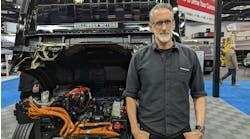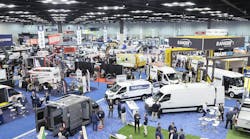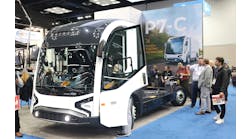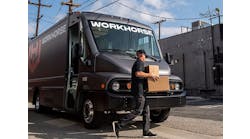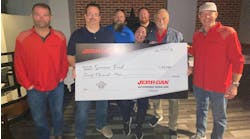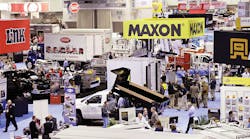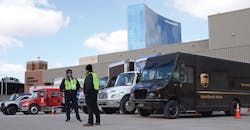If it ain’t broke, don’t fix it.
The Work Truck Show, produced annually by the National Truck Equipment Association (NTEA), will be held for the eighth straight year in Indianapolis at the Indiana Convention Center.
Educational sessions, Green Truck Summit, and the inaugural Fleet Technical Congress begin March 6, and the exhibit hall is open March 7–9.
“Truck equipment distributors and upfitters can get a competitive edge by spending a few days at The Work Truck Show 2018,” says Steve Carey, NTEA executive director. “In addition to evaluating new products and services from more than 500 exhibiting companies, they can also identify new customers and product lines; talk with regulatory experts about vehicle safety requirements; and learn from peers and industry experts how to attract and retain top talent, manage generational differences in the workforce and improve profitability.
“Attending The Work Truck Show 2018 will help fleet managers and others in the vocational truck industry mitigate risk and improve their fleets’ productivity. The Work Truck Show offers an unbeatable opportunity to compare products from 500 exhibiting companies while also learning from peers and industry experts how to capitalize on the vehicle technology revolution, improve truck specifications, implement fleet best practices, and more.”
North America’s largest work truck event is one of the highlights of the year for many companies.
“The Work Truck Show is the biggest show of the year. It’s where many of our major customers come and where we want to come to meet new customers,” says Clay Siegert, co-founder and COO of XL Hybrids.
The Fleet Technical Congress is a training conference designed to address timely issues affecting the vocational fleet community, providing expert strategy and insight to help fleet managers optimize their resources and navigate operational challenges.
Fleet Technical Congress includes a full day of general sessions on Tuesday, March 6, followed by fleet-related concurrent sessions Wednesday, March 7, and Thursday, March 8.
“Fleet Technical Congress is a great opportunity to learn from some of the most accomplished and effective fleet leaders in the industry,” says George Survant, NTEA senior director of fleet relations. “The content is designed to encompass the significant changes taking place in technology as well as fleet management tools. Participants will learn how top performers are improving their companies’ fleet performance and positively impacting their organizations’ bottom lines.”
Fleet Technical Congress kicks off with a keynote address on The Future of Commercial Vehicles delivered by Ed Peper, US vice president of General Motors Fleet. Peper will discuss how rapid changes in product development are driving innovation in commercial vehicles and changing working relationships between chassis OEMs and fleet managers.
Peper’s presentation is followed by five general sessions led by top fleet managers and industry suppliers. Claude Masters, retired fleet manager for Florida Power & Light Co. and past president of NAFA, will moderate Smart, Connected Vehicles and the Impact on Fleet Operations. In this session, Richard Batttersby, equipment services manager for City of Oakland, and others will discuss features and characteristics of connected vehicles influencing management skills, techniques and requirements, as well as how new information can be used to improve operating strategies for increasing fleet reliability and decreasing costs; real-time trend analysis to allow performance and reliability predictions; and diagnostic routines.
Dean Cerimeli, chief operations officer at Original One Parts, and former director of truck product for U-Haul, presents Reactive vs. Predictive Maintenance: Taking Control of Your Future. In this session, he’ll cover how the new wave of real-time information enables fleets to move from reactive to predictive fleet management. Attendees will explore outcomes of a successful predictive maintenance strategy, including improved reliability and reduced workflow disruption.
Integrating Multiple Data Streams to Enhance Fleet Decision-Making outlines the process of gathering and incorporating available data streams from separate sources into a mainstream decision-support model. Subject matter experts from WEX Inc, Andromeda Systems, FleetChek LLC, and ARI will discuss the most robust strategies for exporting data, the role of fleet management companies in the data integration process, and tips for effectively incorporating data captured on equipment less common than trucks and vans.
Kelly Frey, vice president of product marketing for Verizon Telematics, presents “Fleet Management Risks Associated with Discoverable Vehicle-Generated Data.” In this session, he’ll talk about how active and passive data collected on vocational vehicles can impact fleet managers and may be discoverable in the case of accident or inquiry.
Wrapping up the general sessions on Tuesday, Erin Gilchrist, fleet director for Safelite AutoGlass, and Anthony Orta, strategy & compliance manager for Sempra Energy Utilities, Fleet Services, present “Is Your Vehicle Replacement Strategy in a Rut?” They’ll reveal how the traditional fleet replacement strategy of like-for-like substitutions limits opportunities to reduce cost, improve reliability, lower emissions and enhance the driving experience for fleet users. Then they’ll provide insights into how to manage continuous improvement in the face of capital reductions.
Featuring content solely focused on multi-stage commercial vehicles, the Green Truck Summit brings together fleet managers, truck manufacturers, dealers, distributors, and service providers. In addition to participating in the educational program, attendees can get their technical and regulatory questions answered by NTEA staff and see the newest efficiency-boosting products in the Truck Productivity and Fuels Pavilion in the Work Truck Show exhibit hall.
Designed for fleet managers, truck equipment distributors, upfitters, and truck dealers from around the world, the annual conference provides current insights into and long-range forecasts around the latest productivity options and alternative fuel and technology implementation.
“The goal of zero-emission transportation goes beyond just electric driving, and is an industry-wide goal for many, one which we’ve made great strides toward recently,” says Doyle Sumrall, NTEA managing director. “As we continue to focus on achieving that goal in the future, this year’s Green Truck Summit will address immediate, practical steps the work truck industry can take to mitigate negative environmental effects while maximizing truck performance, longevity and the bottom line via alternative fuels, pollutant reduction, advanced technology developments and increased-efficiency practices.”
Green Truck Summit kicks off March 6 at 8:30 am with welcome remarks and a keynote speaker, followed by educational sessions through 5 pm. The day’s agenda also includes lunch and an evening networking reception. General sessions will address the following key topics:
• Government, Fleet and Supplier Perspectives on Future Work Truck Productivity.
• Technology and Fuel Advancements: What’s Next for Fleets.
• Commercial Vehicle Productivity and Efficiency: Insights and Opportunities.
• Strategies for Obtaining Advanced Technology Approval and Selecting Alternative Fuels.
• A Roadmap to Available Local, State and Federal Funds.
• Next Steps for the Future of Work Trucks.
Green Truck Summit attendees can choose from 48 concurrent sessions, with discussions focused on increasing work truck productivity and efficiency; technology advancements across the industry, especially in relation to automation and connectivity; fuel advancements, alternatives and related costs; and vehicle weight reduction and the impact on emissions and pollutants.
In addition to the educational sessions, the Work Truck Show exhibit hall will be open March 7–9, featuring 500 exhibitors, and including the Productivity and Fuels Pavilion, which showcases companies displaying clean technologies and fuel utilization reduction solutions. Additionally, attendees can experience the industry’s latest clean vehicle solutions and alternative fuel applications at Ride-and-Drive, held March 7–8, while test-driving or riding in the newest trucks.
Green Truck Summit attendees will participate in a variety of general sessions offering balanced perspectives from vocational truck and energy industry experts.
General sessions on March 6:
• Government, Fleet and Supplier Perspectives on Future Work Truck Productivity, 9:30–10:45 am: Learn how government, industry and end users are plotting their path forward for greater fuel efficiencies. Also, discover how current regulations and offerings, as well as their ability to be deployed, will shape work truck purchases and productivity over the next decade and beyond. Presented by: Michael Berube, director, US DOE Office of Vehicle Technologies; Keith T Kerman, chief fleet officer, New York City, DCAS; Giorgio Rizzoni, director, Center for Automotive Research, The Ohio State University Center for Automotive Research; and Chris Weiss, VP of engineering, The Knapheide Manufacturing Company.
• Technology and Fuel Advancements: What’s Next for Fleets, 11 am–noon: Gain insights and guidance as leading fleet visionaries present current and near-term emerging technology and fuel usage information as well as the impact on work trucks and buses. This session will highlight current and pending real-world results and opportunities. Key topics will include workplace hybrids, renewable diesel and CNG, lightweighting, connected trucks, near-zero emission ICE and electric traction, including fuel cells. Presented by: Scott Phillippi Sr, director of maintenance & engineering, international operations, UPS Corporate Automotive; a PepsiCo representative; and a fleet representative.
• Commercial Vehicle Productivity and Efficiency: Insights and Opportunities, 1:30–2:30 pm: Work trucks have become complex, integrated systems in response to regulations, consumer savvy and technology advancement. Industry leaders from Ford, Cummins, Odyne, and Workhorse will share perspectives on how future technology strategy and fuel development will advance productivity and efficiency in the work truck industry. Moderated by: John Davis, creator, host, and executive producer, MotorWeek. Presented by: Joe Dalum, president and CEO, Odyne Systems LLC; Julie Furber, executive director, electrification, Cummins Inc.; Graydon Reitz, truck vehicle line director, Ford Motor Company; and Angela Strand, VP, Workhorse Group Inc.
• Strategies for Obtaining Advanced Technology Approval and Selecting Alternative Fuels, 2:30–3:30 pm: Learn a forward-thinking approach to selecting and justifying use of technologies and fuels. Experts will share the value of simultaneously presenting both capital and operations budgets for advanced technology in work trucks. Find out how balancing initial, infrastructure and operational costs paint the picture of the long-run future and why this is critical to successful buy-in for today’s purchase approval. Presented by: Dave Meisel, VP, fleet management, Quanta Services.
• A Roadmap to Available Local, State and Federal Funds, 3:45–4:45 pm: Funding at all levels (federal, state, and local) is available. Explore how and why funding is important but is not a forever strategy to transform your fleet. Gain expert insight on what is accessible and where. Additionally, learn more about VW settlement activity and how organizations are using the funds. Presented by: Stacy Noblet, senior manager, ICF; and Bill Van Amburg, senior VP, CALSTART.
• Next Steps for the Future of Work Trucks, 4:45–5 pm: Gain industry perspective on next steps and actions to advance the vision of an effective, efficient path to zero emissions. Presented by: Doyle Sumrall, managing director, NTEA.
Special session on March 6:
• Lean 101: Straightforward Approach to Lean Implementation for Truck Equipment Upfitters, 9 am–4 pm: See what other NTEA member companies have done to move shop productivity to a new level through workplace organization and streamlining custom jobs. This workshop is targeted to business owners and shop managers who want to learn how to get on the path to gaining a minimum 20-percent increase in shop productivity without adding personnel or equipment and without shutting down current operations. Highlights include: lean thinking as a culture; successfully addressing challenges within truck equipment distributors and upfitters; impacting areas of control versus influence; aligning and engaging employees; targeting and identifying waste; developing straightforward, manageable action plans. Attendees will have the chance to participate in a hands-on upfit exercise modeling shop activity and improvement.
Special sessions on March 7:
• Fleet Management 101, 9 am-4 pm: Conducted by senior professionals from Mercury Associates Inc, the largest dedicated fleet management consulting firm in North America, this seminar offers a thorough introduction to the most important elements of an effective fleet management program. If you are new to fleet management or are a business owner, agency director, or procurement or finance official who serves as the de facto fleet manager in your organization, this workshop is for you. Topics include maintenance program design and shop operations management; outsourcing and supplier management; performance measurement and benchmarking; managing vehicle total cost of ownership; and fleet replacement. Presented by: Marc Canton, senior consultant, Mercury Associates Inc; and Tony Yankovich, senior manager, Mercury Associates Inc.
• Generation Next Leadership Workshop and Networking Reception, 3-5 pm: Successful managers and leaders leverage the power of EQ (emotional intelligence) to engage and motivate their employees and associates. Leaders with high EQ can communicate effectively, provide balanced feedback, guide others through ambiguity, use humor to build rapport, read and respond to the team’s leadership needs and remain optimistic, even in the face of difficulty. These leaders can emotionally and mentally plug into others, read the situation at hand and behave accordingly to get the best results for everyone. Presented by: Jen Shirkani, author and keynote speaker, Penumbra Group.
Special sessions on March 8:
• LTAP Fleet Educational Program: The Work Truck in The Work Zone, 8:30–10:30 am: When we were young, we were told not to play in traffic. But let’s not kid ourselves — in our industry, we make our living working in traffic. Whether you operate a service truck, dump body, aerial lift, or snowplow, it’s imperative to make distracted drivers aware of you, your work truck and your work zone. Indiana Local Technical Assistance Program (LTAP) developed a training session specifically for the workforce with the difficult task of working on or along America’s roads and highways. Moderated by: Richard Domonkos, training manager, Indiana LTAP, Purdue University, Lyles School of Civil Engineering. Presented by: Todd Morrison, technology transfer engineer, Technology Transfer/KY LTAP, University of Kentucky, Transportation Center.
• Lean 201: The Kata Journey—Daily Practice for Scientific Thinking, Mindset and Culture, 9:30 am–1:30 pm: Earlier approaches to lean focused on describing techniques at Toyota, but this is not how people acquire new ways of thinking and acting. Toyota Kata concentrates on developing scientific thinking skills and mindsets—and modifying an organization’s culture—through a process of daily practice coached by line managers. Improvement Kata (IK) and Coaching Kata (CK) make the process transferrable beyond Toyota, to any organization. Presented by: Brad Dye, production supervisor, Nice-Pak Products Inc; Tim Hall, process trainer, Nice-Pak Products Inc; Bill Kraus, manager of client services, AEDC-MS; Dan Mickelson, manager of client services, AEDC-MS; and Mike Rother, independent researcher, Rother & Company.
Keynote speaker
General Michael Hayden, a retired four-star general and former director of the Central Intelligence Agency and National Security Agency, will serve as keynote speaker on Thursday, March 8, as part of the President’s Breakfast & NTEA Annual Meeting.
As head of the country’s premier intelligence agencies through two presidential administrations from 1999–2009, General Hayden was on the frontline of global change, the war on terrorism and the growing cyber security challenge. He understands the dangers, risks, and potential rewards of the political, economic, and security situations our country—and the world—are currently facing.
In addition to leading CIA and NSA, General Hayden was the country’s first principal deputy director of national intelligence and the highest-ranking military intelligence officer in the country. In all of these jobs, he worked to put a human face on American intelligence.
“This is one of the most relevant keynote addresses you will have the opportunity to hear,” says Todd Davis, 2018 NTEA Convention chairman, and vice president of Phenix Enterprises Inc. “General Hayden is an expert on intelligence matters like cyber security, government surveillance, and geopolitics, and he has dedicated his life to protecting both American security and liberty. He will offer an invaluable leadership perspective on navigating through key challenges industry businesses face today.”
Educational sessions
The Work Truck Show includes more than 60 intensive educational programs on upfitting, regulatory compliance and business management topics. In addition, 16 of the world’s leading chassis manufacturers will use The Work Truck Show to provide detailed updates on what’s new and upcoming with their product lines.
MANAGEMENT
Why Insurance Underwriters Don’t Understand Your Business & Ramifications of Misclassification, Tuesday, March 6, 1:30–2:45 pm: Learn the challenges of finding an underwriter familiar with the work truck industry and the nuances of the insurance coverage needed. Presenters will outline the potential impacts of when underwriters misunderstand industry operations. This session will also share recent headlines that may change the way you look at your insurance options. Presented by: Becky Harding, CPCU, director of association programs, JD Fulwiler & Co Insurance; and Gene Rappe, commercial insurance underwriter, Travelers Insurance Company.
Work Truck Industry Overview and Outlook, March 6, 1:30–2:45 pm: Gain economic and market information to help optimize business planning processes. Attendees will learn about work truck industry market trends and how they are affected by US and global economic cycles. This session includes a North American chassis sales forecast— a critical component of market planning for many companies. Presented by: Andrej Divis, director, medium & heavy commercial vehicle research, IHS; and Steve Latin-Kasper, director of market data and research, NTEA.
Specification Preparation: Improving Your Processes, Tuesday, March 6, 1:30–2:45 pm: With continuous changes in manufacturing advancements and government regulatory mandates, it’s important to reevaluate how and when you develop work truck industry specifications. This session will provide key guidance on the effects of current and upcoming regulations as well as tips to develop a more effective specification process. Presented by: Chris Lyon, director of fleet relations, NTEA.
Solutions for Building a Skilled Manufacturing Workforce, Tuesday, March 6, 3–4:15 pm: Demand for skilled workers in the manufacturing industry is on the rise. It’s anticipated that more than two million skilled positions will be open in the next five to 10 years. This session will provide innovative solutions for helping educational institutions and manufacturers build a pipeline of skilled employees to help fill this demand. Presented by: Bill Gaines, chairman, senior engineer, Transfer Flow Inc; and Kirste Webb, executive director, Visionary Center for Sustainable Communities.
Real-World Experience with NHTSA Safety and Defect Reporting Regulations, Tuesday, March 6, 3–4:15 pm: Building on last year’s popular session, NHTSA Reporting Requirements for Multi-Stage Manufacturers, this course offers an industry-specific look at what happens when your business is faced with a multi-million-dollar government noncompliance fine and a consent order to fix the problems. Moderated by: Mike Kastner, managing director, NTEA. Presented by: Wesley Chestnut, manager, product safety and compliance, Spartan Motors; and Bruce York, program manager, NHTSA/ODI/MHDVD, US Department of Transportation.
Overview of U.S. DOE’s Efficient Mobility Systems Program, Wednesday, March 7, 8–9:15 am: The US Department of Energy’s (DOE’s) Energy Efficient Mobility Systems (EEMS) program envisions a future in which the seamless movement of people and goods is enabled by an energy-efficient transportation system utilizing new and disruptive technologies. In this session, hear from government and industry stakeholders on real-world applications of these technologies and their potential impact on energy usage in the transportation sector. Presented by: David Smith, program manager, advanced vehicle systems, Oak Ridge National Laboratory; Mark Smith, vehicle technologies deployment manager, US Department of Energy; and Sam Spofforth, executive director, Clean Fuels Ohio.
Ready…Hire…Aim: Just Because Your Competition Hires This Way Doesn’t Mean You Should, Wednesday, March 7, 8–9:15 am: Do you have a formal selection process for hiring? Are you confident it yields exceptional new team members? What makes for a great hire? According to Cyndi Gave, president of The Metiss Group, employers who hire exclusively for hard skills will fire for soft skills every time.
I Hired Workers But Human Beings Showed Up—Now What?, Wednesday, March 7, 9:30–10:45 am: Are you confident all your employees are performing at their highest potential? Are you doing everything you can as a leader to accelerate the performance of your direct reports? During this session, participants will learn: actionable cultural approaches that can be applied; seven techniques to accelerate performance; and how to tailor leadership practices to your direct reports’ styles. Presented by: Gave.
Business Information Security: Fundamentals for Small and Mid-Sized Companies, Wednesday, March 7, 9:30–10:45 am: Customers and employees count on you to protect their information—and you count on them to run your business. Bottom line: it’s your responsibility to provide adequate and appropriate security. In this session, Patricia Toth from National Institute of Science and Technology will explain necessary steps to protect your information, systems and networks.
Building a Championship Team, Thursday, March 8, 9:30–10:45 am: Exceptional performance is the perfect alignment of skills, rewards, feedback, management style, measurement and culture. Keeping employees engaged requires staying in-tune with what is most important to them—finding ways to creatively match cultural features with their motivating factors. This session is designed to help leaders learn about employee performance drivers and easy-to-apply techniques for their engagement, encouragement and development. Presented by: Jen Shirkani, author and keynote speaker, Penumbra Group.
Beyond Bins and Racks: Exploring Possible Upfit Configurations on North American Van Platforms, Thursday, March 8, 9:30–10:45 am: As van utilization continues to increase, there are opportunities to upfit these vehicle platforms with an expanded array of equipment applications that have not been heavily utilized in North America. Presented by:Tim Campbell, managing director, Campbells Consultancy; and Bob Raybuck, director of technical services, NTEA.
SALES
Are You Leaving Money on the Table? Tuesday, March 6, 3–4:15 pm: Across almost all industries, only about 10 percent of all companies make as much profit as they should. This session will demonstrate ways to improve your financial results—not just a little, but a lot. Attendees will learn about setting profit priorities, or directing efforts toward the greatest potential payoff. Presented by: Al Bates, principal, Distribution Performance Project; and Jeff Messer, president, Messer Truck Equipment
TECHNICAL
FMVSS 111 Rear Visibility Full Compliance Requirements: How Commercial Vehicles Are Affected, March 6, 1:30–2:45 pm: The Federal Motor Vehicle Safety Standard (FMVSS) 111 rear visibility regulation requires full compliance for all vehicles with a 10,000-pound or less gross vehicle weight rating, effective May 2018. Presented by: Susan Dehne, senior director of technical services, NTEA; and Steve Spata, technical assistance director, NTEA.
Clean and Competitive: A Canadian Perspective on the Path to Zero Emissions, Wednesday, March 7, 8–9:15 am: Canada has made addressing climate change a key priority. Policy and technological developments in this area have important implications for US and Canadian companies in the vocational truck industry. Moderated by: Jeff Phillips, managing director, Dawson Strategic. Presented by: Mark Goody, business development manager, FleetCarma; Jamie Hulan, manager, Cross-Sectoral Energy Division, Environment and Climate Change Canada; and Bruce Winchester, executive director, Canadian Natural Gas Vehicle Alliance.
Improving ROI, Payload, and Operational Safety with Curb Weight Reduction, Wednesday, March 7, 8–9:15 am: Hear three different lightweighting perspectives and experiences to help you view work truck weight in a new light. Each pound removed brings new opportunities to improve overall equipment ROI. Topics will include additional payload capacity, new materials, technology options, and more. Moderated by: Andrew Burnham, principal environmental scientist, Argonne National Laboratory. Presented by: George Mayhew, vehicle engineering and development, Verizon; and Peter J. Young, director business development NA, Ranger Design.
Expected Improvements in Work Truck Efficiency Through Connectivity and Automation, Wednesday, March 7, 9:30–10:45 am: Gain insights from government, industry, and academic leaders of research and development, and deployment efforts. This session will explore how connected and automated vehicle technologies, multimodal systems and system optimization may change the medium- and heavy-duty vocational truck market. Moderated by: Kevin Walkowicz, senior project leader, vehicle testing and evaluation, National Renewable Energy Lab. Presented by: Joe Dalum, president and CEO, Odyne Systems LLC; Scott Phillippi, senior director of maintenance & engineering, international operations, UPS Corporate Automotive; Gregory Shaver, professor of mechanical engineering, Purdue University.
Vehicle Weight Reduction—Every Pound Counts, Wednesday, March 7, 9:30–10:45 am: Learn how to choose a lower GVWR vehicle, use new materials, and implement lightweighting strategies that can save money and potentially help eliminate driver compliance issues. Presented by: Stephen Anderson, principal engineer, body design and manufacturing, Altec Industries Inc; Amy Dobrikova, president, Intelligent Fleet Solutions; and Omar B Sandlin II, VP, business development USA, Drive Products.
FLEETS
Partnering with Procurement to Enhance Your Decision-Making in Complex Technical Bids, Wednesday, March 7, 8–9:15 am: There are often internal conflicts over who owns what activities in the relationship between procurement and fleet operators. The optimal solution is a clear delineation between fleet and procurement roles. Moderated by: Dave Meisel, VP, fleet management, Quanta Services. Presented by: Richard Ho, category lead, Pacific Gas and Electric; and John Adkisson, manager, transportation services, PPL Electric Utilities.
The Future of Diesel, Wednesday, March 7, 8–9:15 am: Diesel is known as one of the most energy-dense fuels available for transportation. Concerns about national dependence on petroleum and emissions penalties paid for unmodified diesel are leading the trend toward two products with features and advantages traditional diesel fuel lacks. Differences and relative strengths of biodiesel and renewable diesel will be examined by a panel that includes two large fleet users of each product, with discussion moderated by a pioneering scientist in the field of alternative diesel fuels. Presented by: Marty Mellera, manager of climate action and greening, San Francisco Municipal Transportation Agency (MUNI); Jennifer Weaver, OEM market development manager, National Bio Diesel Board; Randall von Wedel, principal biochemist, CytoCulture; and a Florida Power and Light Representative.
Get 20% More Productivity Out of Your Next Work Truck Purchase, Wednesday, March 7, 8–9:15 am: Veteran fleet professionals and technology providers will share real-world examples of how they designed their work trucks using data. This session will address ways to turn your actual data into tangible results with minimal cost. Moderated by: Chris Lyon, director of fleet relations, NTEA. Presented by: Scott Lepold, client solutions specialist, FleetCarma; and Meighan Read, fleet engineer, Duke Energy.
Specification Quality: How to Ensure Fleet Performance Improvements, Wednesday, March 7, 8–9:15 am: Operational productivity and efficiency start with great specifications. New materials, technology, and products offer significant improvements you can leverage. Explore how changing the elements in your work truck specifications can be the foundation to future improvements in your fleet. Presented by: George Survant, senior director of fleet relations, NTEA.
A Clean Fuel at the Best Overall Cost, Wednesday, March 7, 8–9:15 am: Low emissions or low total cost-of-ownership? With propane autogas, fleets get both. Join Propane Education & Research Council to find out how autogas offers fleets the lowest total cost-of-ownership for the amount of emissions reduced. This session offers an opportunity to learn about the latest propane autogas technology, like low-NOx engines, and hear from fleet managers and industry leaders on why propane autogas is the right fuel, right now. Presented by: Michael Taylor, director of autogas business development, Propane Education & Research Council.
The Conflict Between What We Believe and What the Fleet Data Says, Wednesday, March 7, 9:30–10:45 am: What we often believe is not what the data tells us. Hear current and accurate facts that will challenge your understanding and potentially change the way you operate and maintain your fleet. Presented by: Christopher Shaffer, CEO, Utilimarc.
A New Era for Fleet Budgeting, Wednesday, March 7, 9:30–10:45 am: As management demands better results with less resources, future fleet leaders will utilize more compelling presentations to support their operations. Learn how using better data and trend analysis for more realistic forecasts can help. Presented by: Survant; and Richard Callis, senior manager, fleet, PepsiCo.
How Last-Mile Delivery is Impacting Vehicle Design and Fleet Mission, Thursday, March 8, 9:30–10:45 am: The evolution of technology is dynamically redesigning information management, speed of accurate decision-making and how the work itself is completed. Hear how Amazon and UPS are planning to meet this challenge with redesigned trucks, packaging and delivery methods to improve their last-mile delivery experience—all while improving customer satisfaction and reducing expenses. Moderated by: Kevin Beaty, president, Yunnan-US New Ventures LLC. Presented by: Representatives from Amazon and UPS.
Sorting Out Customer Wants to Correctly Size Your Fleet, Wednesday, March 7, 9:30–10-45 am: Proper fleet utilization drives maintenance costs, fuel use and fleet size. During this session, attendees will learn the impacts of an underutilized fleet, an acceptable level of spare vehicles and how to identify underused trucks. Moderated by: Mike Britt, CEO, MG Britt Consulting. Presented by: Jim Bigelow, senior director, enterprise fleet, Cox Enterprises; and Todd Carlson, principal manager, fleet asset management, Southern California Edison (SCE).
Vehicle AVL/GPS: Insights into How to Make the Right Choice for Your Fleet, Thursday, March 8, 9:30–10:45 a.m.: Fleets have unique automatic vehicle location (AVL) and global positioning system (GPS) needs. With a vast array of choices available in today’s market, fleet managers can simplify decision-making challenges by understanding which types of systems best meet their requirements and budgets. Moderated by: Bill Burns, fleet operations manager, City of Columbus Fleet Management Division. Presented by: Chris Bate, director of marketing, Samsara; and Bob Shuey, CEO, Cortaga Inc.
Unique Challenges in Government Fleet Management, Thursday, March 8, 9:30–10:45 am: Government fleets face challenges in funding, public perception, and managing the diversity of their fleets. They operate under different performance standards and financial characteristics while meeting expectations of elected officials and associated politics. Presented by: Sara Burnam, director, fleet management, Palm Beach County; and Robert Martinez, deputy commissioner, NYPD.
How You Can Use Process and Outcome Indicators to Accelerate Your Fleet’s Performance, Thursday, March 8, 9:30–10:45 am: Learn how decades of measurement and data analysis are the foundation for and can produce powerful growth in performance for fleet operators and owners. Survant will share key process and outcome indicators he has developed through the years and explain the uses of each. Presented by: Survant.
Identifying Fleet-Ready Technologies to Avoid Risk When Deploying Electrified Vehicles, Thursday, March 8, 9:30–10:45 am: To meet sustainability requirements, more fleets are seeking electrified vehicle solutions that are outside the OEM box, including aftermarket upfits and vehicles from start-up OEMs. To avoid unnecessary risk when deploying electrified vehicles, fleet managers want fleet-ready technologies that are reliable, integrate seamlessly into operations and won’t affect OEM warranty. A panel of national fleet managers will discuss available options and explain what fleet-ready means to them and how it reduces risk. Presented by: Clay Siegert, COO, XL Hybrids; and Other Fleet Representatives.
Utilizing Idle Reduction to Mitigate Fuel Use, Thursday, March 8, 9:30–10:45 am: Idle time for vocational trucks can be a significant contributor to fuel use because of the need to provide power using a PTO-driven hydraulic pump and as a result of traffic congestion. Learn about currently available options for mitigating these high-idle times. Presented by: Dave Barna, fleet operations manager, Henkels & McCoy; Bruce Beegle, VP, truck and military sales, Vanner Inc; Ryan Hulleman, green fleet market manager, Altec Inc; and Tom Kanewske, VP of business development, Derive Systems.
Transferring Line Haul Knowledge to Vocational Applications, Thursday, March 8, 9:30–10:45 am: Many concepts that save fuel for highway tractors also benefit vocational applications. Attend this session for information on lightweighting, idle reduction, tire inflation, engine parameters, and more. There are numerous ways to help your fleet run on less—make regional-haul findings best practices for your local operations. Presented by: Dave Schaller, industry engagement director, North American Council for Freight Efficiency.
How Does the US Compare to Western Europe in the Race to Cleaner Transportation? Thursday, March 8, 9:30–10:45 am: This session will discuss the status of alternative vehicle development in Europe and North America as well as what developing trends mean for the future. Presented by: Bill Van Amburg, senior VP, CALSTART.
CHASSIS
Throughout the Work Truck Show, OEMs will be on hand once again to provide technical details on chassis specifications, design, body installation, and equipment mounting options, as well as future plans related to the work truck industry. See the schedule below.
• International Truck Update Session, Tuesday, March 6, 1:30–2:45 pm:
• Nissan Commercial Vehicles Update Session, Tuesday, March 6, 1:30–2:45 pm.
• Chevrolet Commercial Vehicles and GMC Update Session, Tuesday, March 6, 3–4:15 pm.
• Freightliner Trucks Update Session, Tuesday, March 6, 3–4:15 pm.
• Mitsubishi Fuso Truck of America Inc Update Session, Tuesday, March 6, 3-4:15 pm.
• Isuzu Commercial Truck of America Inc. Update Session, Wednesday, March 7, 8–9:15 am.
• Ram Commercial Update Session, Wednesday, March 7, 8–9:15 am.
• Kenworth Truck Company Update Session, Wednesday, March 7, 8-9:15 am.
• Ford Commercial Vehicles Update Session, Wednesday, March 7, 9:45–11 am.
• Freightliner Trucks Advanced Drive and Fuel Technology, Wednesday, March 7, 9:30–10:45 am.
• Western Star Trucks Update Session, Wednesday, March 7, 9:30-10:45 am.
• Freightliner Custom Chassis Corporation Update Session, Wednesday, March 7, 9:30–10:45 am.
• Peterbilt Motors Company Update Session, Thursday, March 8, 9:30–10:45 am.
• Hino Trucks Update Session, Thursday, March 8, 9:30–10:45 am.
• Mack Trucks Inc Update Session, Thursday, March 8, 9:30-10:45 am.
For printable listing of NTEA Agenda and Exhibitors list, click DOWNLOAD.
